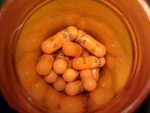College can be a stressful time in a young person’s life. Trying to balance your studies, social obligations and work can be difficult juggle of daily anxiety. As colleges demand more of their students, some have begun taking drastic measures to increase their attention on their assignments.
ADHD, attention deficit hyperactivity disorder, is now the most commonly diagnosed mental health disorder in children. Stimulants, a category of drugs that increase the activity of the central nervous system, are used to treat ADHD, and as the number of children diagnosed with ADHD has risen, so has the number of stimulants prescribed. The sale of stimulants has risen drastically “from $1.7 billion in 2002 to almost $9 billion in 2012.”
With the increase of stimulant drugs on college campuses, they have become progressively more available to students who do not need them but still find them beneficial for their academic performance. College students cramming for a test will now resort to abusing prescription medications that are unnecessary and detrimental to their physical and mental health. Students who wish to increase their efficiency, focus and energy just simply pop a study pill, and are then able to study for hours on end without getting bored or distracted.
Natural stimulants like coffee and tea increase cognitive function and have few negative side effects. These beverages have long been a staple of college life and helped tired and overworked students focus for extended periods of time. Synthetic stimulants, like Dexedrine, Adderall and Ritalin, are generally prescribed to treat ADHD and narcolepsy by increasing the activity of the neurotransmitter’s dopamine and norepinephrine.
https://www.instagram.com/p/BTousc2lzlJ/?utm_source=ig_web_copy_link
Dopamine’s major functions in the brain are to activate other neurotransmitters and to aid in exploratory and pleasure-seeking behaviors. An excess of dopamine has been linked to schizophrenia, and a deficit in this chemical has been linked to depression, ADHD and Parkinson’s disease. Stimulants increase the amount of dopamine in the brain and are widely regarded as the best treatment for individuals diagnosed with ADHD.
Norepinephrine, a neurotransmitter involved in our body’s alarm response, increases blood pressure, heart rate and breathing and decreases blood flow throughout the body. High doses of prescription stimulants can lead to irregular heartbeat, heart failure, seizure or death. Mild stimulants have been ingested by humans for decades, but we are only now beginning to understand the long-term effects of synthetic prescription stimulants.
As study drugs like Adderall and Ritalin become prescribed to more children, the number of people becoming addicted to prescription stimulants is rising. When prescribed a healthy dosage, individuals with ADHD can reduce their symptoms of hyperactivity and increase their attention span while responsibly managing the negative side effects of these drugs. Stimulants reduce drowsiness and appetite, and in some cases, can lead to malnutrition or insomnia.
Stimulant abuse can be particularly detrimental to your heart in large doses and can lead to increased heart rate, anxiety and even death. A few short-term effects of these drugs include “loss of appetite, disturbed sleep patterns, nausea, bizarre erratic behavior, hallucinations, psychosis and seizures” that can result in death in large doses.
The long-term effects are less understood but include “permanent damage to blood vessels, liver, kidney and lung damage, respiratory problems, decreased immune response, malnutrition, psychological and physical dependence, psychosis, depression and epilepsy.”
Many tend to overlook these negative effects because they see the positive impacts stimulants can have on individuals who have legitimate medical reasons for using them but ignoring the dangerous potential of study drugs is an ignorant stance that has contributed toward the normalization of drug abuse on college campuses.
Everyone’s brain chemistry is different. Some may need the extra boost of focus that stimulants grant them, but most people can live a healthier, more productive life by finding healthy alternatives to study drugs.
Many believe that they need study drugs to maintain good academic standing. Once they begin taking them to study, they may find it harder and harder to study for extended periods of time without the help of study drugs. If you think you have a problem with stimulant abuse, you’re not alone.
Many college students struggle with the anxieties and stress that come with our education system, but that doesn’t mean there isn’t a better way to achieve success in your studies. A few alternatives to study drugs that can boost your energy, focus and motivation are meditation, regular exercise and natural stimulants. Depending on the subject, some obtain the help of an English tutor.
Meditation is something that our generation often mocks as a pointless waste of time, but if you have never tried it, I urge you to simply sit quietly for 20 minutes and focus on your breathing. It won’t be easy, but if you stick with it you may find that your thoughts are clearer and more beneficial toward your emotional state.
Our generation’s attention span has been depleted by the lifestyles prevalent in our modern culture and technology that offers endless entertainment at our fingertips. I believe it is important to take a break from our screens to gain a fresh, more focused mindset.
Another option is to begin exercising more regularly. Exercise also plays a crucial role in regulating the amount dopamine and norepinephrine in our brains, the neurotransmitters that are affected by stimulant use. Many stimulant addicts who begin to exercise regularly find it boosts the chemicals in their brain that increase motivation and focus in a healthier fashion than resorting to study drugs.
Finally, if you must take stimulants, ingest much smaller doses of milder natural stimulants, like coffee or tea, instead of synthetic prescription drugs. Natural stimulants do not have many negative side effects and can be just as effective in increasing focus on your assignments.
As stimulants become easier to attain, more students are abusing them for non-medical reasons. According to the Center on Addiction, a national survey conducted in 2016 found that 38.5 percent of college-age individuals believe that taking these drugs for nonmedical reasons did not pose “a great risk.” This represents a stark contrast with the dangerous reality of the situation.
The normalization of stimulants has led to overuse, abuse, and addiction. It is up to us, as current college students, to change this unhealthy trend on our campuses. If we begin to educate our generation on the danger’s stimulants pose, and offer healthy alternatives to these dangerous practices, we can make a positive impact on the mental health problems that plague our generation.














I recently tried – https://www.trythecbd.com/products/cbd-gummies/ in favour of the triumph time and I forced to remark, I’m impressed with the results. I felt more blas‚ and at diminish, and my longing was significantly reduced. The CBD gummies tasted pronounced and were gentle to consume. I’ll surely be using them again and would counsel them to anyone looking for a regular way to alleviate prominence and anxiety.